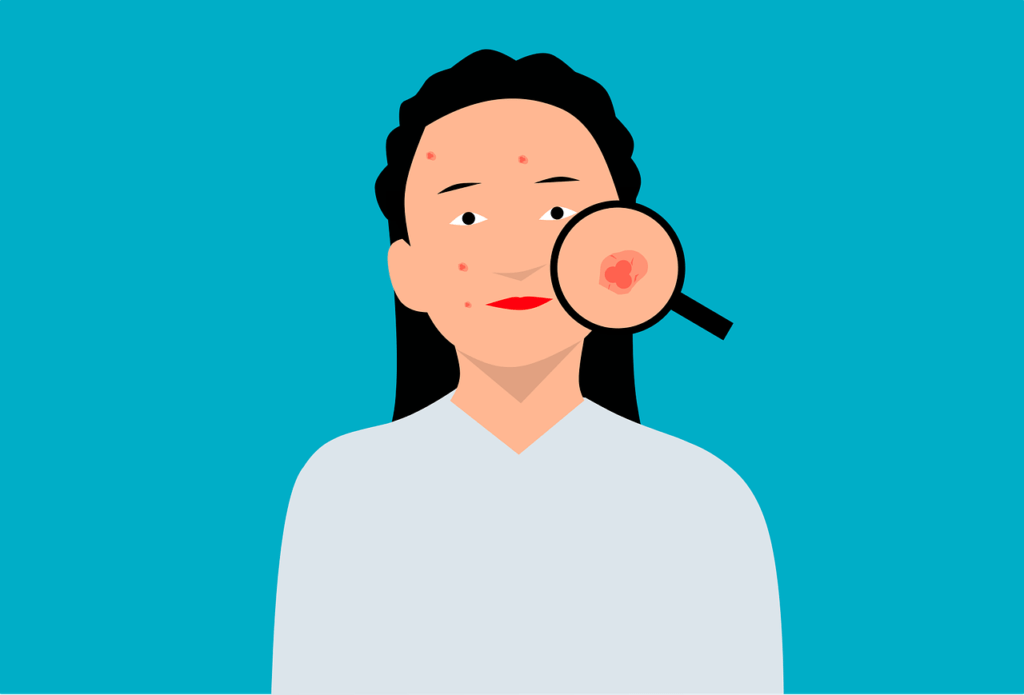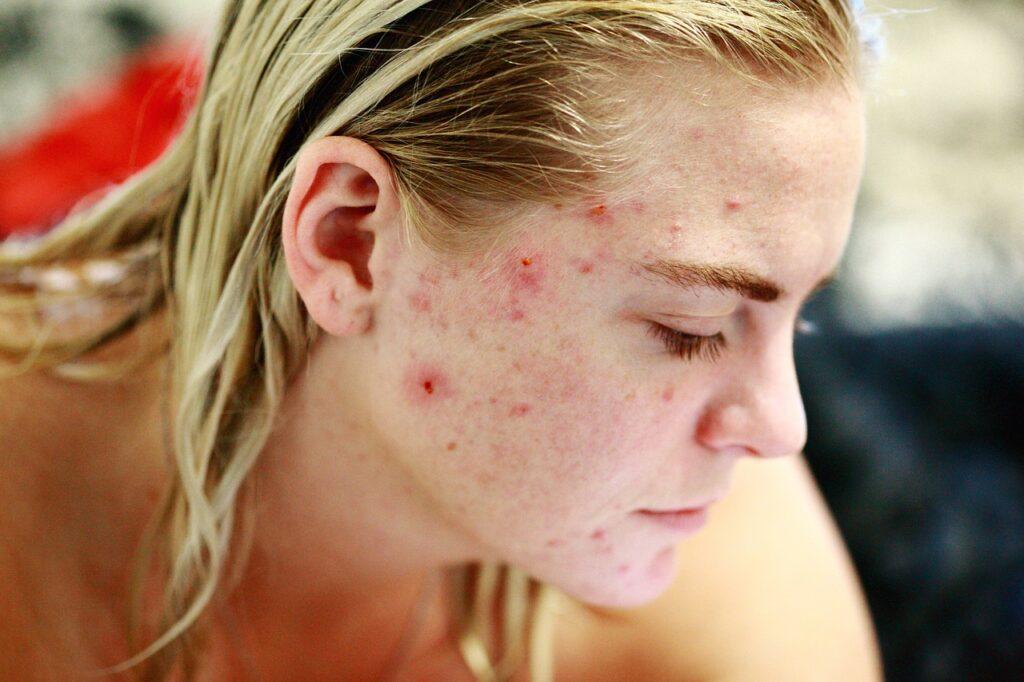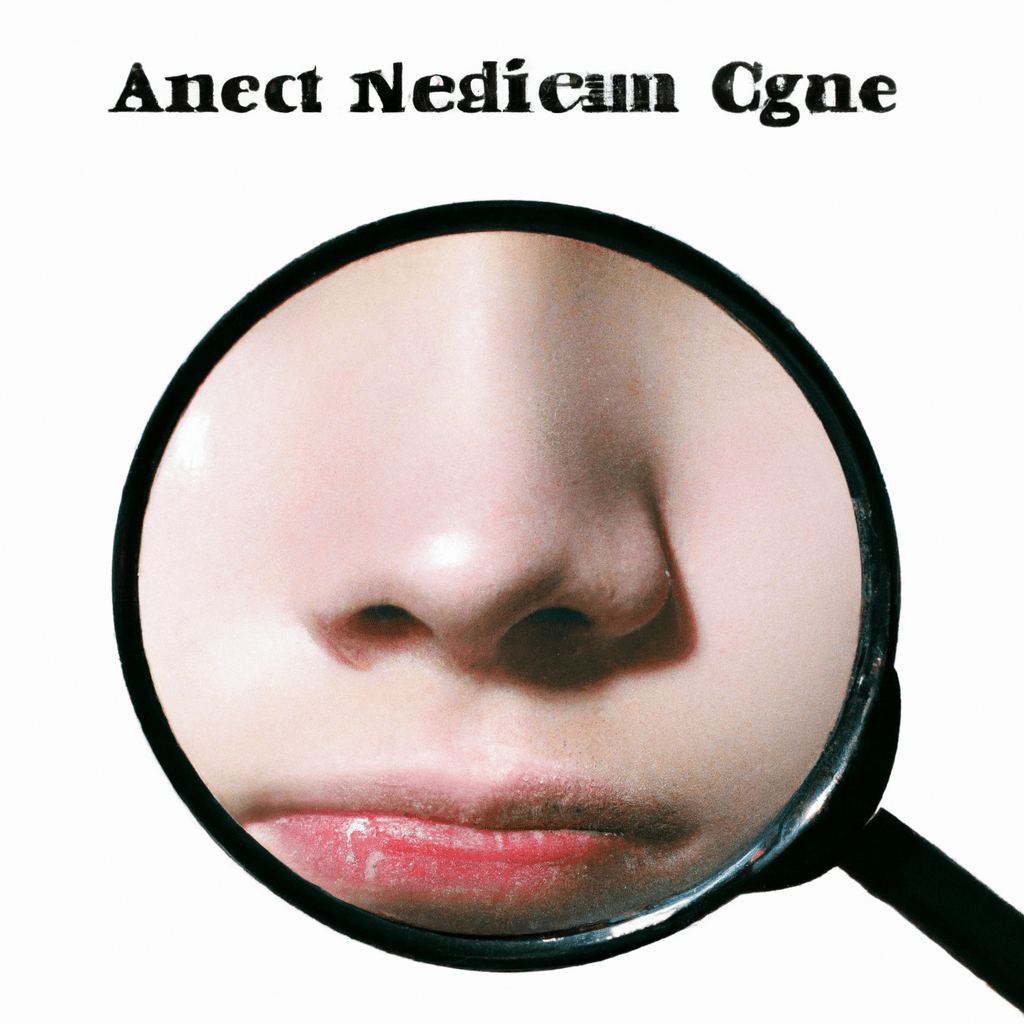You may be surprised to discover that your thoughts about acne could actually have an impact on the condition of your skin. Yes, that’s right – obsessing over those pesky pimples might actually be making them worse. Research suggests that negative thoughts and stress can lead to the release of hormones that exacerbate acne symptoms. So if you’ve been constantly fixating on every blemish and feeling self-conscious about your complexion, it might be time to take a deep breath and shift your focus towards self-care and positive thinking. Your skin will thank you for it!

The Link Between Stress and Acne
Understanding the impact of stress on acne
Acne is a common skin condition that affects millions of people worldwide. While factors such as hormones, diet, and genetics often play a role in acne development, research has shown that stress can also significantly contribute to the severity and frequency of breakouts.
When you experience stress, your body releases a hormone called cortisol. Elevated cortisol levels can stimulate the production of sebum, the oily substance that clogs pores and leads to acne formation. Additionally, stress can exacerbate inflammation in the skin, making existing acne lesions more painful and difficult to heal.
Exploring the nervous System’s role in Acne Formation
The nervous system, specifically the sympathetic nervous system, plays an important role in acne formation. When you are stressed, the sympathetic nervous system becomes active, leading to increased inflammation, oil production, and pore-clogging.
Furthermore, stress can disrupt the delicate balance of your skin’s microbiome, the community of bacteria that naturally reside on your skin. This disturbance can contribute to the development of acne-causing bacteria, such as Propionibacterium acnes.
Psychological factors contributing to acne development
In addition to the physiological impact of stress on acne, psychological factors can also contribute to the development and exacerbation of acne. Negative thoughts and emotions can trigger a stress response in the body, leading to increased cortisol levels and subsequent acne outbreaks.
Moreover, individuals who struggle with self-esteem and body image issues may be more likely to experience stress and anxiety related to their acne. This heightened psychological distress can further perpetuate the cycle of acne development and increase the severity of breakouts.
The Power of the Mind-Body Connection
Examining the mind-body connection and its effect on skin health
The mind-body connection refers to the close interplay between our thoughts, emotions, and physical well-being. Numerous studies have demonstrated the significant impact of psychological factors on various skin conditions, including acne. Understanding this connection is crucial for effectively managing and treating acne.
When you experience negative emotions, such as stress, anxiety, or sadness, your body releases stress hormones that can disrupt your body’s natural healing processes and aggravate skin conditions like acne. Conversely, cultivating positive thoughts and emotions can have a beneficial effect on the skin by reducing inflammation and promoting skin healing.
How negative thoughts and beliefs can negatively impact acne?
Negative thoughts and beliefs about your acne can have a profound impact on how you perceive and manage your condition. Constantly thinking about your acne in a negative light can increase stress levels and trigger a cycle of self-consciousness and low self-esteem. This, in turn, can lead to increased inflammation and hormonal imbalances, further worsening acne symptoms.
It’s important to recognize that acne does not define your worth or attractiveness as a person. Acknowledging and challenging negative thoughts and beliefs about your acne is a crucial step towards improving your mental well-being and ultimately managing your acne more effectively.
The role of positive thinking and self-esteem in managing acne
On the other hand, cultivating positive thinking and self-esteem can have a transformative effect on how you approach and cope with your acne. Research has shown that individuals with higher self-esteem are more likely to engage in healthy self-care practices, such as consistent skincare routines and stress-reducing activities.
By embracing a positive mindset and practicing self-acceptance, you can reduce stress levels, enhance your overall well-being, and potentially improve your acne symptoms. It’s important to remember that your worth as an individual is not determined by the condition of your skin.
Psychosomatic Effects of Acne
Defining psychosomatic effects and their relationship to acne
Psychosomatic effects refer to the influence of psychological factors on physical health conditions. Acne, being a visible and often stigmatized condition, can have profound psychosomatic effects on individuals. The psychological stress and emotional burden associated with acne can further exacerbate the severity and persistence of breakouts.
Understanding the psychosomatic effects of acne is crucial for addressing the emotional well-being of individuals with acne and devising effective treatment strategies that address the mind-body connection.
Impact of stress, anxiety, and depression on acne severity
Studies have consistently demonstrated a strong connection between stress, anxiety, depression, and the severity of acne. Chronic stress can lead to hormonal imbalances, increased inflammation, and impaired skin healing, all of which contribute to the development and persistence of acne lesions.
Similarly, anxiety and depression can significantly impact an individual’s ability to cope with and manage their acne. These psychological conditions can lead to increased levels of stress, poor self-care habits, and decreased adherence to treatment regimens, further worsening acne symptoms.
Exploring the concept of acne dysmorphia
Acne dysmorphia, also known as body dysmorphic disorder (BDD) with an acne-related focus, is a psychological condition characterized by an obsessive preoccupation with perceived flaws in one’s appearance. Individuals with acne dysmorphia often spend excessive amounts of time scrutinizing their skin, engaging in avoidance behaviors, and experiencing high levels of anxiety and distress.
Acne dysmorphia can significantly impact an individual’s quality of life and self-esteem. It is important for individuals experiencing these symptoms to seek professional help and support in order to manage their acne-related psychological distress effectively.
Cognitive-Behavioral Therapy for Acne
Introduction to cognitive-behavioral therapy (CBT)
Cognitive-behavioral therapy (CBT) is a widely researched and effective therapeutic approach used to address a range of psychological conditions, including anxiety disorders, depression, and body dysmorphic disorder. CBT focuses on identifying and challenging negative thoughts and beliefs and replacing them with more constructive and realistic ones.
When applied to acne management, CBT can help individuals recognize and challenge distorted beliefs about their appearance and acne, develop healthy coping strategies for managing stress, and improve their self-esteem and overall well-being.
Applying CBT techniques for managing acne-related stress
Several CBT techniques can be useful in managing acne-related stress and its psychological impact. These techniques include cognitive restructuring, which involves identifying and reframing negative thoughts about acne, behavioral activation, which focuses on engaging in pleasurable and meaningful activities to counteract negativity, and relaxation techniques, such as deep breathing exercises or progressive muscle relaxation.
By incorporating these CBT techniques into your daily routine, you can gradually build resilience against stress and better manage the emotional toll of acne.
Effectiveness of CBT in reducing acne severity
Research has demonstrated the effectiveness of CBT in reducing acne severity and improving quality of life for individuals with acne. By addressing the underlying psychological factors associated with acne, such as stress, anxiety, and negative thought patterns, CBT can help break the cycle of negative thinking and improve treatment adherence.
CBT also equips individuals with the necessary tools and skills to manage stress and cope with the psychosocial impact of acne, leading to a more positive mindset and better overall outcomes in acne management.

Mindfulness and Meditation for Acne
Exploring the benefits of mindfulness and meditation for acne sufferers
Mindfulness and meditation practices have gained widespread recognition for their ability to reduce stress, promote relaxation, and improve overall well-being. For individuals with acne, incorporating mindfulness and meditation into their self-care routine can have significant benefits.
By practicing mindfulness, you can develop a heightened awareness of the present moment and cultivate a non-judgmental attitude towards your acne. This can help reduce stress levels, break the cycle of negative thinking, and enhance your overall emotional well-being.
Mindful eating and its impact on skin health
In addition to mindfulness and meditation, mindful eating can also play a role in improving skin health for acne sufferers. Mindful eating involves paying close attention to your food choices, the act of eating, and your body’s hunger and fullness cues.
By adopting a mindful approach to eating, you can make conscious choices that support skin health, such as consuming a nutrient-rich diet with anti-inflammatory properties. Additionally, mindful eating can help prevent emotional eating and associated stress, which can contribute to acne flare-ups.
Guided meditation practices to reduce stress and improve acne
Guided meditation practices can be a valuable tool in reducing stress and improving acne symptoms. By listening to guided meditations that specifically target stress reduction and self-acceptance, you can cultivate a calm and positive mindset, which in turn can have a beneficial effect on your acne.
These practices often involve focusing on the breath, visualizations, and affirmations to promote relaxation, self-compassion, and emotional resilience. Regularly incorporating guided meditation into your self-care routine can contribute to a more balanced and mindful approach to managing your acne.
External Factors vs. Internal Factors
Differentiating between external and internal factors in acne development
When it comes to acne development, it is essential to understand the distinction between external and internal factors. External factors refer to environmental influences that can contribute to acne breakouts, such as exposure to pollutants, harsh skincare products, and poor hygiene practices.
On the other hand, internal factors are primarily physiological and include hormonal fluctuations, genetics, and lifestyle choices. Both external and internal factors can influence acne development, and addressing both aspects is crucial for comprehensive acne management.
Impact of external stressors on acne outbreaks
External stressors, such as academic or work-related pressure, relationship issues, or financial problems, can have a significant impact on acne outbreaks. Stress triggers the release of stress hormones, such as cortisol, which can disrupt the skin’s natural balance and contribute to the development of acne.
In addition, external stressors can lead to unhealthy coping behaviors, such as poor dietary choices, insufficient sleep, and excessive skincare practices, all of which can further exacerbate acne symptoms.
Addressing internal factors and their impact on acne
While external factors can undoubtedly contribute to acne outbreaks, internal factors play a crucial role in acne development as well. Hormonal fluctuations, particularly during puberty, menstrual cycles, or times of increased stress, can lead to increased sebum production and clogged pores.
Genetics also play a significant role in determining an individual’s predisposition to acne. Understanding and addressing these internal factors, along with managing external stressors, is key to effectively managing and preventing acne breakouts.

Developing a Positive Self-Care Routine
Importance of adopting a holistic approach to acne management
Adopting a holistic approach to acne management is essential for addressing both the physical and psychological aspects of the condition. This approach involves considering various factors that can influence acne development, such as lifestyle choices, stress levels, skincare routines, and self-esteem.
By adopting a comprehensive self-care routine that takes into account these factors, you can enhance your overall well-being, improve your skin health, and better manage your acne.
Creating a skincare regimen that promotes self-care and self-acceptance
A well-designed skincare regimen can go beyond treating the physical symptoms of acne and become an act of self-care and self-acceptance. It is important to choose gentle and non-irritating products that are suitable for your skin type.
Incorporating regular cleansing, exfoliation, and moisturizing into your skincare routine can help keep your skin clean, balanced, and nourished. By viewing your skincare routine as a form of self-care, you can foster a positive relationship with your skin and boost your overall confidence.
Incorporating stress-reducing activities into daily life
Stress reduction is a crucial component of managing acne effectively. Incorporating stress-reducing activities into your daily life can help break the cycle of stress-induced acne breakouts and promote emotional well-being.
Engaging in activities such as exercise, yoga, meditation, or spending time in nature can significantly reduce stress levels and improve your skin health. Finding activities that bring you joy and help you unwind is key to managing stress and supporting your overall acne management efforts.
Breaking the Cycle of Negative Thinking
Recognizing negative thought patterns and their effect on acne perception
Negative thought patterns can significantly influence how you perceive your acne and can perpetuate feelings of self-consciousness and low self-esteem. It’s crucial to recognize and challenge these negative thought patterns to break the cycle of negative thinking and improve your mental well-being.
Common negative thought patterns include catastrophizing (exaggerating the negative impact of acne), mind-reading (assuming others are negatively judging your appearance), and personalization (blaming yourself for acne development). By becoming aware of these patterns, you can begin to challenge their validity and replace them with more constructive and realistic thoughts.
Challenging cognitive distortions and reframing negative beliefs
Cognitive distortions are irrational and exaggerated thinking patterns that can contribute to negative thoughts and beliefs about your acne. By challenging these cognitive distortions, you can begin to reframe negative beliefs and cultivate a more positive mindset.
For example, if you find yourself catastrophizing your acne and believing that it defines your worth as a person, you can challenge this belief by reminding yourself of your other positive qualities and accomplishments. Reframing negative beliefs requires practice and self-compassion, but the results can be transformative in improving your overall well-being.
Building a positive mindset for improved acne management
Building a positive mindset is essential for effectively managing acne and supporting your mental well-being. Embracing self-acceptance and cultivating a positive attitude towards your appearance can alleviate the emotional distress associated with acne and promote a greater sense of well-being.
It’s important to remember that nobody is perfect, and acne is simply a common skin condition that many individuals experience. Treating yourself with kindness and practicing self-compassion can help shift your focus from judgment to self-acceptance, improving your mental health and allowing you to manage your acne more effectively.

Seeking Professional Help for Acne-Related Stress
Signs that acne-related stress requires professional intervention
While many individuals can effectively manage their acne-related stress on their own, there are instances where seeking professional help becomes necessary. Signs that it may be time to seek professional intervention include chronic and severe anxiety or depression related to your acne, difficulty functioning in daily life, social withdrawal, or the development of acne dysmorphia.
A qualified dermatologist or therapist can provide specialized support tailored to your individual needs and help you navigate the emotional challenges associated with acne.
The role of dermatologists and therapists in managing acne and its psychological effects
Dermatologists play a vital role in managing acne by providing medical interventions and skincare advice. They can prescribe appropriate medications, recommend skincare products, and perform in-office treatments to address the physical symptoms of acne.
Therapists, on the other hand, can provide invaluable support in managing the psychological effects of acne. They can help individuals develop coping strategies, challenge negative thoughts and beliefs, and improve self-esteem. Therapy can provide a safe space to explore and process the emotions associated with acne, ultimately fostering resilience and well-being.
Exploring available therapies and treatments for acne sufferers
Several therapeutic modalities can be helpful for individuals with acne. These may include cognitive-behavioral therapy (CBT), acceptance and commitment therapy (ACT), and dialectical behavior therapy (DBT). Each of these therapies can address different aspects of acne-related stress, and it’s important to consult with a mental health professional to determine the most appropriate treatment approach for your specific needs.
In addition to therapy, dermatological treatments such as topical or oral medications, light therapy, chemical peels, and extractions can be effective in managing the physical symptoms of acne. Consulting with a dermatologist can help determine the most suitable treatment options for your unique case.
Conclusion
In conclusion, the link between stress and acne is undeniable. Stress can significantly contribute to the severity and frequency of acne breakouts, disrupting the delicate balance of the skin and triggering physiological processes that lead to acne formation.
Understanding and addressing the psychological impact of acne is equally important. Negative thoughts and beliefs, as well as psychological conditions like anxiety and depression, can exacerbate acne symptoms and hinder effective management.
By exploring the power of the mind-body connection, incorporating stress-reducing practices, challenging negative thought patterns, and seeking professional help when needed, individuals can develop a comprehensive approach to acne management. By adopting a positive mindset, practicing self-care, and addressing both the physical and psychological aspects of acne, individuals can improve their overall well-being and effectively manage their acne.




